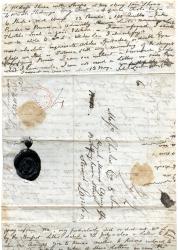
Autograph Letter Signed to Messrs Charles Cox & Son, Royal Marine Agency Office, Buckingham Street, Strand, London.
8vo bifolium (leaf dimensions 30 x 18 cm): 4 pp. Fair, on aged paper with slight wear to extremities, and minor damage to the area around the breaking of the black wax seal, which adheres, with a clear impression of a crest, to the reverse of the second leaf. Damage to a couple of words: otherwise text clear and complete. Circular 'F' postmark in red ink. Docketed. An impassioned, anguished letter, long and unguarded, and unusual in the valuable light it casts on the state of West Indian colonial affairs. The first three-quarters of the letter from 12 February and the rest from 13 February. 'Colony is in a most horrible State of con
but thank God tolerably healthy - but Party Prejudices <&> venemous [sic] Plots Leagues & Feuds have sapped the Vitals of Intercourse of mutual Social Intercourse - [sic] I am the marked Object, Target & sooner than undergo another twelve months such incessant, heartrending Persecution I would return to undergo the Horrors of Brixton Tread Mill -'. He wishes John Reeves had answered him. 'I must have it again pressed upon Him I should have endeavoured indeed was making Arrangements to have returned to England in March by the Brig Donald Captn Johnston but dreadful & but mark, mark well - a troublesome mischievous radical to annoy & disturb the Colony prosecutes me for receiving Exorbitant Fees since my First Arrival'. Describes how he has been 'examined before House of Assembly & after most cross, foul Examination were upon Oath from those thought my real Friends a Bill was endeavoured to be passed in the House of Assembly to House or Council above'. Describes a legal 'Tug of War', culminating 'Bench in Confusion my Lord the Governor enraged & it being stated I should add to the Confusion, Misery & Disturbance of this dreadfully
divided Colony I did acquiesce I did agree to Travers & until next Sessions - now mark - I can not return this Season - my great Friend Chief Justice Gloster has thro Earl Huntingdon positively forbid me entering his House Earl H - is most severely cruel - telling me I am the Cause of all & every Trouble, vexation &cc in the Colony'. Berates Reeves for not sending 'the much desired Information'. '[...] but why will not Mrs L write - but not a word more on that subject I forgive Her from my inmost Soul & Heart - but for Gods Sake do not let Her forget me the Coat is almost a dead Burthen, Loss - Thirty Two Pounds Eighty Pounds Currency - merciful Father - my good Lord hurries me worries me about my half Pay - declares my signing the Affidavit absolute Perjury & will not sancition it'. The last part of the letter is mostly made up of instructions and requests. Concludes: 'I almost forgot most absolute requisite articles Spectacles or double Eye Glass in Steel or Tortoise Shell any mounting of the strongest magnifying Power I can [sic] see without a borrowed Glass what I have wrote. I can not read a Letter or news Paper | I expect an answer about 13 May.' The only record of Lodington's fate is contained in two later letters (12 June and 3 July 1824) by him, in which he describes the departure for England of the Earl of Huntingdon just before his (i.e. Lodington's) trial, commenting 'Gaol in this Town, death is preferable'. (According to the DNB Huntingdon resigned the Governorship in 1824, as a result of 'a misunderstanding with the other authorities on the island'.)


